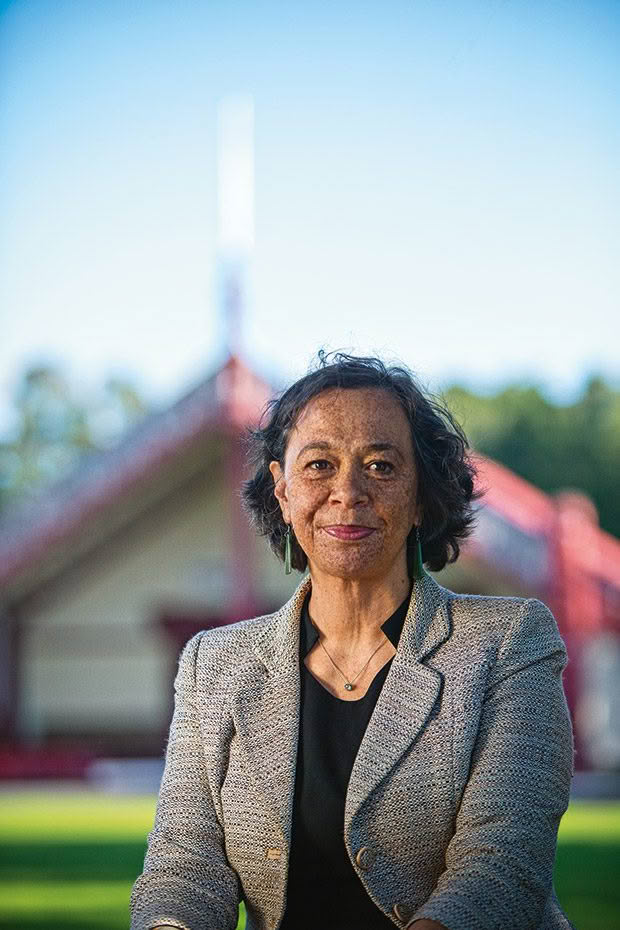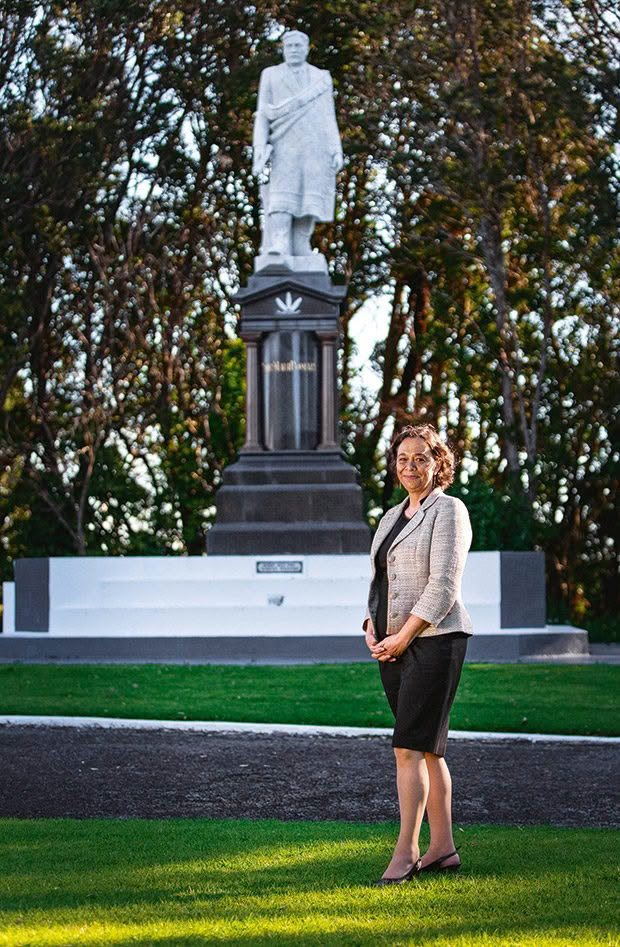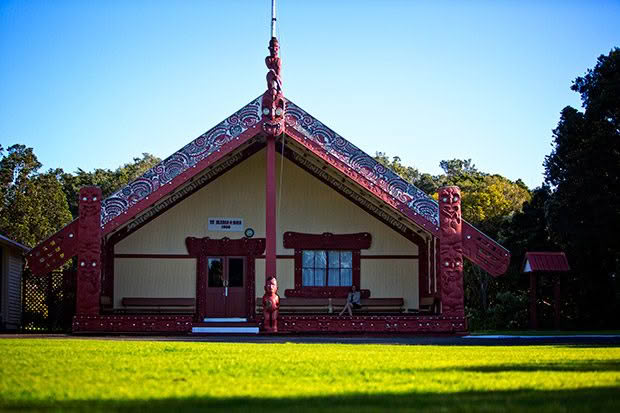Māori leader Amokura Panoho led negotiations with the Crown over the 1881 invasion of Parihaka for seven years

Meet Amokura Panoho, the first subject of our new series focusing on Māori leadership. Amokura, the author of previous features for NZ Life & Leisure, will write the series from the next issue.
Words: Kate Coughlan Photos: Scott McKinnon
PEPEHA
Ki te taha o tōku māmā
Ko Taranaki te maunga
Ko Te Atiawa, Taranaki me Ngā Ruahinerangi ngā iwi
Ki te taha o tōku pāpā
Ko Ngāti Kahungunu, Rangitāne, Ngāti Apakura me Ngāti Mutunga, Ngāi Tahu, Kāti Māmoe ngā iwi
WHAT DO YOU WANT TO ACHIEVE?
“You are a queen-maker not the queen,” I was told recently, which is apt.
People would push me to be out front, but I’ve never been comfortable in that role, though I have taken it when necessary. From 2009 to 2016, I led my people in the Parihaka negotiations with the Crown [seeking redress for the 1881 pillage of Parihaka, the home of 2000 pacifists].
My husband’s ill health meant our family had to return to Auckland before finalizing the negotiations. However, I am not the first woman for whom family obligations have meant leaving a leadership role at a pivotal time, and I won’t be the last. While in a leadership role, you must make sure you leave something of substance for the next person.
There are different styles of leadership. Puna Wano-Bryant, the young wahine who took over from me as the chair of Papakāinga Parihaka, led the reconciliation acknowledgement. On the day of the Crown’s apology she was just beautiful, with her use of Te Reo and historical knowledge.
She took the audience on the Parihaka journey and had everyone crying, including me. I thought to myself: “No one can challenge her, she represents the voice of our kuia and of their pain at what happened in Parihaka, which has never been heard or acknowledged until now.” I could not have done it in the way she did.
“Whenua”, which people think of as referring only to land, means afterbirth. Connection with the land is secured through whenua, through the burial of afterbirth on the land. Women have the status of whare tangata — holding the house on the land. That significant power resides only with women.
Tribal leadership is defined not only by whakapapa but by the obligation of those in leadership roles to look after their people. If leaders do not do so, they lose mana.
IMPROVING LIFE FOR THE NEXT GENERATION
My tribe, Te Atiawa [the largest iwi in Taranaki] were the first to experience confiscation of land at an extreme scale. With our leaders branded as rebels, the government’s reprisal was brutal. This led to disconnection and internalized pain and manifested in intergenerational violence and abuse for many.
And, in many situations, in turning our backs on our history. In my whānau, our kuia protected us from the story of Parihaka because it is horrendous for women. The sacking of Parihaka and the ongoing legislation against the settlement and leaders is a story of shame and degradation.

My grandfather, whose mother was a 17-year-old at the sacking of Parihaka, did not want me to identify as Māori. When, as an 18-year-old Auckland uni student, I returned to Taranaki for Parihaka commemorations, he said to me: “You are old enough to know better.”
He did not want me dragged into the pain of the past and thought he was saving me. He had high expectations for me: I was the first of my family not to be pregnant at 16, first in my family to go to university. Here was I, becoming politicized at Auckland university, but I could not tell my own story.
And my grandfather, such a repository of knowledge, had entirely disconnected from it. It was very sad. As a tribe, we must address the past, and now we move on.
SECURING A FINANCIAL FUTURE
The challenge is to believe in our capacity to develop solutions for future generations. In the past, Māori were waiting outside the bank manager’s door but — in this post-settlement environment — the bank managers are coming to our hui.

Te Atiawa has just launched the Ka Uruora Scheme, an iwi-supported savings scheme. This financial platform is unique in several ways; the prospectus is in Te Reo and, in recognition of our diaspora particularly in Western Australia, savings into the New Zealand scheme don’t incur a penalty.
PERSONAL COST
A massive goal is to bring our people home (from 6000 registered members only 2000 actively participate) and the iwi-supported savings scheme works to that. We have two of the eight Taranaki iwi on board, with each matching the savings (dollar for dollar) of those who whakapapa to it. The door is open to join the scheme (and we hope they do), then it will be of unparalleled benefit.
Our people are so widespread that we take roadshows to them, to reach out to these often-isolated members. I know this firsthand with my three sons all living in Western Australia, working in the oil and gas industry.
However, our family suffered the ultimate tragedy with the suicide, in 2018, of our middle son. It is an epidemic and part of being disconnected, living without their identity being part of their norm. You never think your family will be affected, and the pain is immense. It has changed me.
Read more about the government troop invasion of the home of Te Whiti-o-Rongomai and Tohu Kākahi, leaders of peaceful resistance to government land confiscation in the late 1800s, at nzhistory.govt.nz
WHAT ARE YOUR MOST SIGNIFICANT ROLES?
Current: Head of Auckland Council Te Matatini, which supports the Southern Hemisphere’s largest indigenous biannual cultural festival. It will be hosted by Auckland from 23 to 27 February 2021.
Auckland Foundation trustee. The foundation is a strong, donor-led service that makes philanthropy easy, effective and impactful in the Auckland region. Elected trustee of Te Kotahitanga o Te Atiawa, the post-settlement tribal entity holding, managing and administering the trust fund for the benefit of members of Te Atiawa descent.
Past: Chair of the Parihaka Papakāinga Trust from 2009 to 2016. During this time appointed to Kawe Tūtaki (a vehicle towards closure) along with Dame Tariana Turia, former prime minister Jim Bolger, former MP Mahara Okeroa and pre-eminent Te Reo Māori advocate Dr Ruakere Hond, who were charged with reporting to the Crown on redressing serious historical grievances suffered at Parihaka.
On 24 October 2019, Te Pire Haeata kī Parihaka — the Parihaka Reconciliation Bill — was passed in Parliament.
A MEMORY THAT’S LEFT
Poem by Amokura Panoho
With his smile I saw our son
A faded shadow across his brow
A slight tremor as he lost his thoughts
And turned to me to see how
Its come to pass that we are here
Facing such loss so irrationally
With our sons life at end
and my husbands failing memory.
We weren’t prepared for this life
With memories lost and ever-present grief
But with each moment that these burdens lift
A quiet solace though sometimes brief
Comes in ways that hold us in place
Our childrens children,
A legacy, our ancestors gift.
Where to find help and support:
Need to Talk? – Call or text 1737
Lifeline – 0800 543 354 or (09) 5222 999 within Auckland
Youthline – 0800 376 633, text 234, email talk@youthline.co.nz or online chat
Samaritans – 0800 726 666
Depression Helpline – 0800 111 757
Suicide Crisis Helpline – 0508 828 865 (0508 TAUTOKO)
Love this story? Subscribe now!
 This article first appeared in NZ Life & Leisure Magazine.
This article first appeared in NZ Life & Leisure Magazine.
